|
Thank You, Lord, for Socks
Before Thanksgiving meals at my grandparents' house in Cincinnati, we participated in a special Thanksgiving grace. This prayer was based around the invitation to have everyone "go around the table and say something you’re thankful for.” In this situation and others like it, I became stressed out by the pressure to come up with “something good” – i.e. some prayer that makes me seem adequately grateful to God in the ears of those I pray with. Therefore, I try to avoid being the first person to offer to the room the reason for which I'm grateful. I need time enough to think of something esoteric; something that justifies to my family or friends the amount of time I have spent in post-secondary theological studies; something that gives evidence of a decent prayer life; some prayer that shows that I have recognized God's work in a place where not many may have recognized it. As long as I'm given enough time before the table gets around to me, I might show my "advanced spiritual depth" by deciding to give thanks to God for something like "the ability even to give You gratitude, which is sourced in You." Of course, the pressure to give thanks for a "smart" reason is entirely self-imposed, and fairly egotistical. G.K. Chesterton, an author noted for his joy and sense about the world God gave us, offers us this practice to chew on: “You say grace before meals. All right. But I say grace before the concert and the opera, and grace before the play and pantomime, and grace before I open a book, and grace before sketching, painting, swimming, fencing, boxing, walking, playing, dancing and grace before I dip the pen in the ink.” There's no word on how complex Chesterton's "grace" is, and I imagine it's simple enough that spoken words may not always be necessary... a breath of gratitude. Children are more likely to practice this sort of gratitude than adults, which is probably one reason why Christ says we should be more like them. It's the "silly" things, the gifts spoken by the smallest children in these table prayers, which are endearing and ultimately demonstrate the right conception of gratitude - a child saying "Thank you, God, that I get to wear my favorite socks today." I could have legitimately said "thank you" in this prayer for anything that popped into my head. My socks are also gifts from God, and I may rejoice in them. Sure, it is good to take the time to step back and reflect on what areas of God's gifts we may have recently missed in our lives. It is not a bad thing to realize that even our ability to give thanks to God comes from the free will he has bestowed upon us. However, remembering to give glory to God for whatever we happen to be doing at this moment is an even better spiritual habit. Do me a favor and read Psalm 136 today, which ends, "Give thanks to the God of heaven, for his steadfast love endures for ever." Happy Thanksgiving. Laura Berlage serves as Director of Religious Education for Incarnate Word Parish in the Archdiocese of St. Louis.
0 Comments
Just like Rebecca discussed in her post last week, I also had the privilege of attending the Catholic Leadership Conference at The Catholic University of America. While at the conference, there were a number of presentations about how our Catholic faith impacts leadership. One of the key aspects that truly underlines all decision-making is prayer. Prayer can be just about anything, and that constant dialogue with God can help fortify any sort of decision that we have to make. The keynote speaker of the conference, Col. Larry Morris, dedicated a decent portion of his address on his own personal prayer. He discussed how he began and ended every day in prayer. Being a military man and lawyer, he found that structured prayer was his way of findings God's support for the day.
Prayer is an essential part of faith that allows for heaven and earth to interact on a very personal level. The Church puts great emphasis on prayer and how it penetrates every aspect of life. The Church has even devoted the fourth and final section of the Catechism of the Catholic Church to prayer and what prayer means. Mother Teresa often spoke about payer and how prayer affects the individual. She once said, "Prayer makes your heart bigger, until it is capable of containing the gift of God himself. Prayer begets faith, faith begets love, and love begets service on behalf of the poor." Prayer can transform the heart in ways that are inexplicable. It is done in such a way that it can be perceptible and communal. While prayer is that moment of personal connection with God, it is still part of our community within the Church. We pray as a Church, and that sense of community can come in a number of different ways. The most evident example of this is in the celebration of Mass. Mass is an opportunity where the physical and divine can meet; it is where Jesus physically is present within us. Mass is where the community of believers can come together wherever they are and be united in that one moment. The second example comes from other common prayers of the Church, such as devotions, novenas, and other prayers that have developed over the centuries. Here the same words of prayer are expressed all across the world in hundreds different languages and, in a similar manner to the Mass, they unite us all. The final example is our own personal prayer that often occurs with no structure or sometimes, even without words. This personal prayer is a part of the common desire to speak with God that unites the world. When prayer gets brought into decision-making, the process instantly changes. Instead of making quick decisions based on outside forces, prayer helps guide us to the decision with a certain amount of comfort. Daily prayer can help answer the small day-to-day decision. Prayer is also a great resource when major decisions come up. We will each face major decisions in our lives, and the types of decisions are unique to us. When we bring it prayer, we can make a clearer and firmer decision. Pat Fricchione is the Research and Production Associate for the Catholic Apostolate Center 11/24/2013 Holy Mass for the Conclusion of the Year of Faith on the Solemnity of Our Lord Jesus Christ, King of the UniverseRead NowHomily of Pope Francis
Saint Peter's Square Sunday, 24 November 2013 Today’s solemnity of Our Lord Jesus Christ, King of the Universe, the crowning of the liturgical year, also marks the conclusion of the Year of Faith opened by Pope Benedict XVI, to whom our thoughts now turn with affection and gratitude for this gift which he has given us. By this providential initiative, he gave us an opportunity to rediscover the beauty of the journey of faith begun on the day of our Baptism, which made us children of God and brothers and sisters in the Church. A journey which has as its ultimate end our full encounter with God, and throughout which the Holy Spirit purifies us, lifts us up and sanctifies us, so that we may enter into the happiness for which our hearts long. I offer a cordial and fraternal greeting to the Patriarchs and Major Archbishops of the Eastern Catholic Churches present. The exchange of peace which I will share with them is above all a sign of the appreciation of the Bishop of Rome for these communities which have confessed the name of Christ with exemplary faithfulness, often at a high price. With this gesture, through them, I would like to reach all those Christians living in the Holy Land, in Syria and in the entire East, and obtain for them the gift of peace and concord. The Scripture readings proclaimed to us have as their common theme the centrality of Christ. Christ is at the centre, Christ is the centre. Christ is the centre of creation, Christ is the centre of his people and Christ is the centre of history. 1. The apostle Paul, in the second reading, taken from the letter to the Colossians, offers us a profound vision of the centrality of Jesus. He presents Christ to us as the first-born of all creation: in him, through him and for him all things were created. He is the centre of all things, he is the beginning: Jesus Christ, the Lord. God has given him the fullness, the totality, so that in him all things might be reconciled (cf. Col 1:12-20). He is the Lord of creation, he is the Lord of reconciliation. This image enables to see that Jesus is the centre of creation; and so the attitude demanded of us as true believers is that of recognizing and accepting in our lives the centrality of Jesus Christ, in our thoughts, in our words and in our works. And so our thoughts will be Christian thoughts, thoughts of Christ. Our works will be Christian works, works of Christ; and our words will be Christian words, words of Christ. But when this centre is lost, when it is replaced by something else, only harm can result for everything around us and for ourselves. 2. Besides being the centre of creation and the centre of reconciliation, Christ is the centre of the people of God. Today, he is here in our midst. He is here right now in his word, and he will be here on the altar, alive and present amid us, his people. We see this in the first reading which describes the time when the tribes of Israel came to look for David and anointed him king of Israel before the Lord (cf. 2 Sam 5:1-3). In searching for an ideal king, the people were seeking God himself: a God who would be close to them, who would accompany them on their journey, who would be a brother to them. Christ, the descendant of King David, is really the “brother” around whom God’s people come together. It is he who cares for his people, for all of us, even at the price of his life. In him we are all one, one people, united with him and sharing a single journey, a single destiny. Only in him, in him as the centre, do we receive our identity as a people. 3. Finally, Christ is the centre of the history of humanity and also the centre of the history of every individual. To him we can bring the joys and the hopes, the sorrows and troubles which are part of our lives. When Jesus is the centre, light shines even amid the darkest times of our lives; he gives us hope, as he does to the good thief in today’s Gospel. Whereas all the others treat Jesus with disdain – “If you are the Christ, the Messiah King, save yourself by coming down from the cross!” – the thief who went astray in his life but now repents, clings to the crucified Jesus and begs him: “Remember me, when you come into your kingdom” (Lk 23:42). Jesus promises him: “Today you will be with me in paradise” (v. 43), in his kingdom. Jesus speaks only a word of forgiveness, not of condemnation; whenever anyone finds the courage to ask for this forgiveness, the Lord does not let such a petition go unheard. Today we can all think of our own history, our own journey. Each of us has his or her own history: we think of our mistakes, our sins, our good times and our bleak times. We would do well, each one of us, on this day, to think about our own personal history, to look at Jesus and to keep telling him, sincerely and quietly: “Remember me, Lord, now that you are in your kingdom! Jesus, remember me, because I want to be good, but I just don’t have the strength: I am a sinner, I am a sinner. But remember me, Jesus! You can remember me because you are at the centre, you are truly in your kingdom!” How beautiful this is! Let us all do this today, each one of us in his or her own heart, again and again. “Remember me, Lord, you who are at the centre, you who are in your kingdom”. Jesus’ promise to the good thief gives us great hope: it tells us that God’s grace is always greater than the prayer which sought it. The Lord always grants more, he is so generous, he always gives more than what he has been asked: you ask him to remember you, and he brings you into his kingdom! Let us ask the Lord to remember us, in the certainty that by his mercy we will be able to share his glory in paradise. Let us go forward together on this road! Amen! As I sit here in an airport restaurant in Indianapolis on Sunday morning, the sun is just starting to rise over the tarmac. I have been here for the National Catholic Collegiate Conference (NC3) and the National Catholic Youth Conference (NCYC) with other members of the Catholic Apostolate Center staff. Today also marks the Solemnity of Our Lord Jesus Christ, King of the Universe and the closing of the Year of Faith.
Over 23,000 young people from across the country, mostly high school students, have been here since Thursday attending presentations, workshops, concerts, and liturgies of various kinds. Throughout the course of these conferences (which are held simultaneously), I have had the privileged opportunity to interact with hundreds of young people who are, in one way or another, seeking to deepen their faith and grow in communio with their friends both new and old, youth and campus ministers, women and men religious, and parish priests. What a beautiful way to end this Year of Faith, proclaimed by Pope Benedict XVI and concluded by Pope Francis. The faith and witness that these young people show to the Church in the United States and to the world by their presence here at NC3 and NCYC is remarkable. Whether they realize it or not, they are heeding Pope Benedict XVI’s call from Porta fidei to live and experience “an authentic and renewed conversion to the Lord, the one Savior of the world.” In his homily this morning in Saint Peter’s Square, Pope Francis spoke of the journey of faith that begins at baptism. He said, “A journey which has as its ultimate end our full encounter with God, and throughout which the Holy Spirit purifies us, lifts us up and sanctifies us, so that we may enter into the happiness for which our hearts long.” As we conclude this Year of Faith and prepare to enter into the liturgical season of Advent, it is my prayer that I might not forget the joy, enthusiasm, and witness that I have experienced this weekend here in Indianapolis. It is my hope that this Year of Faith may remain alive in our hearts as we journey toward a fuller encounter with God and a renewed spirit of conversion to Christ. Alex R. Boucher is the Program & Operations Manager for the Catholic Apostolate Center. Follow Alex on Twitter at @AlexBoucher. This past weekend I was fortunate enough to attend a conference on Catholic leadership. I attended a session that really made me think completely differently about vocations. I’ve always thought of the term “discernment” as only really applying to those thinking of entering the priesthood or religious life. While I’ve certainly thought about paths other than marriage, I always felt like I was not in any type of discernment process. But I have come to realize that we all have to discern, trying to figure out our calling.
I've always understood vocation as God calling us to a certain way of life, whether that be priesthood, religious life, married life, or even the single life. Any vocation has its challenges and rewards, and for me, trying to figure out exactly where God is calling me has been a challenging experience, yet one that has certainly deepened my own faith. One frustration I've always had is that I never had my "moment," that point in your life where you can see clearly what God's plan for you is. I have heard many people describe their own moments of realization and I've always longed for that clarity and joy which they seem to possess, knowing that they are fulfilling God's call in their life. Then one of the sessions I attended this past weekend changed my feelings on finding that "moment." The presenter talked about discernment not only as a process but also as a choice. We do have a choice in the direction our lives take, as God, in His infinite wisdom, gave us the gift of free will. We try to spend our lives living in a way that is pleasing to Him, but ultimately we do have choices. This presenter talked about examining our lives, finding where our strengths lie, and following a path which utilizes those talents. This is easier said than done, but it also made me think about my own discernment process. I had been waiting around for some great revelation in which God tells me exactly where He wants me and I have this realization that I know for certain where I need to be. The reality is, we rarely know anything for certain; we can only strive to do God's will here on earth. I recognize now that my vocation is something I need to actively pursue, rather than passively wait for. I challenge you to do the same. What are your strengths, what are you good at? Where can you serve God the most effectively in your own life? Don't wait for answers. Seek them out! Rebecca Ruesch is the Blog Editor for the Catholic Apostolate Center Just two weeks ago, Pope Francis named Fr. Kurt Burnette as the head of the Byzantine Eparchy of Passaic, in the United States. How is it, though, that the Roman Pontiff has the authority to name a bishop of an Eastern Rite? In many regards, we owe this to the work of a 16th century saint, St. Josaphat, whose feast we celebrate today, Nov. 12. The Ruthenian Church, a branch of the Eastern Church mainly found in Russia, Ukraine, Lithuania and Poland which was once part of the Eastern Church is now in full communion with Rome.
St. Josaphat, born around the year 1580, is one of few people from an Eastern Rite who has gone through the canonization process in the Roman Catholic Church. As a young man, St. Josaphat tried to live a virtuous life, which led him to a Basilian monastery in Vilna, Lithuania. His great virtue caused him to be elected abbot of his own and other monasteries, and later appointed as bishop and archbishop in Poland. While an agreement had been signed between the Ruthenian Church and the Roman Catholic Church early in his life, there were many members of the Ruthenian Church who did not want to be in communion with Rome. Neither side was completely innocent in their actions, with violence and betrayal being perpetrated on both sides. However, there were men and women on each side of this ecumenical disagreement who tried to rise above the conflict. St. Josaphat was one of these men. For all his attempts to mend the rift between the Ruthenian Church and the Roman Church, St. Josaphat was hated by many in his native land (Lk. 4:24). Eventually, due to his work in bringing about reforms of the clergy in Lithuania and Poland, as well as efforts to bring the Ruthenian Church into better relation with Rome, he was beaten, stabbed, and shot. His body was dumped unceremoniously by his attackers into a river. Recognized as a martyr by the Roman Catholic Church, St. Josaphat was beatified in 1643 and canonized in 1867. In the Farewell Discourse in the Gospel according to St. John, Christ is praying in the Garden of Gethsemane before His arrest. One famous line from His prayer is “that they may all be one” (Jn. 17:21). This is the work that St. Josaphat was trying to accomplish in the small corner of God’s vineyard to which he was assigned. How often do we fail to recognize the importance of Christian unity? We will soon, in 2017, be marking the 500th anniversary of the beginning of the Protestant Reformation. Within some of our lifetime’s, in 2054, we will be recognizing the end of the first millennium of the Great Schism. Our Church has been broken apart for far too long. We have failed, in many accounts, to ‘breathe with both lungs’ as Bl. John Paul said. Yet, in the spirit of St. Josaphat, great work is being done. Popes Benedict and John Paul II did amazing work in dialoging with the Lutheran and Calvinist communities. Both of them, as well, met with Archbishop Rowan Williams, the then spiritual head of the Anglican Church. Pope Francis has continued on this same track. He has met with the Coptic Pope Tawadros II, head of Egypt’s 8 million Coptic Christians. Even the Patriarch of the Eastern Church, Bartholomew of Constantinople, was present at the inaugural Mass of Pope Francis, a step which had not happened since the Great Schism. We are witnessing historical moments in our Church today. Let us continue to pray the words that Christ Himself prayed in the Garden, let us hope for the total unification of our Church, and let us, in all charity, always welcome home those who come back to our Mother Church. We should follow the example of St. Josaphat who, even in the face of violence and hatred, sought out peace and unity above all things. St. Josaphat, pray for us! Michael Phelan is in his second and final year in the Echo Program at the University of Notre Dame and serves as an Apprentice Catechetical Leader at Nativity Catholic Church in Brandon, FL, in the Diocese of St. Petersburg. As we draw nearer to the end of the celebration of the Year of Faith I think it is important that we not lose site of the crucial call of the New Evangelization. In effort to sustain the energy, enthusiasm, and inspiration we all drew from the Year of Faith, we should not forget what it is that we’re up against. The enemy can only reach a vantage point if he is ignored and therefore permitted to advance his position and plan of attack. This is what I hear the Bishops warning against in the following excerpt in which they discuss the obstacles to the transmission of the faith.
“The principal obstacles to the transmission of the faith are the same everywhere and arise from within the Church and the Christian life, namely, a faith which is lived in a private and passive manner; a person's not feeling the need to be instructed in the faith; and a separation of faith from life. The responses also mention obstacles from outside the Christian life, especially from culture, that make it difficult and perilous to live and transmit the faith: consumerism and hedonism, cultural nihilism; and a closure on transcendence which extinguishes any need for salvation.” The response from the Bishops is two-fold: 1) Obstacles from within and 2) Obstacles from without. I don’t know which to fear more? Perhaps, the obstacles that exist from within are more detrimental to the life and mission of the Church than the obstacles that arise from the outside. Nevertheless, we can be sure that a combination of the two can be deadly to the spiritual life. I know in my personal life there are many times in which I have chosen a “private and passive” manner of living out my faith that was certainly influenced by the culture. I don’t need to go to Mass, I don’t need to confess my sins to a priest, I don’t need to visit the sick, I don’t need to donate or give my money for the benefit of the Church or others, I don’t need to stand out on a public sidewalk with a sign that causes people to reflect on how abortion hurts everyone. And so on, and so forth. My faith, so I thought was fine the way it was: “personal and passive.” Except that’s not the way Faith was meant to be lived. Faith, like life, is not meant to be lived in isolation! We are social beings with a need for communion! We can’t allow an individualized, “what’s in it for me” type of culture to get us to think sharing and living out our faith in communion doesn’t matter! I am fully aware of this now and my vocation to teach reminds me every day that I am not called to be a passive receiver of the Gospel but an active “re-gifter”! Bart Zalvetta is a member of the Theology Department of Skutt Catholic High School in Omaha, Nebraska I try to make it to weekday mass before work. One day recently, father spoke of self-possession. “We must fully possess ourselves to fully give ourselves.” For me, these words could not ring more true.
My service year thus far has been one of immense growth, complete with intense growing pains (I went from 5’4” to nearly 5’9” in middle school and I remember complaining to my father how much my knees and legs were hurting). Until mass that day, I didn’t connect that I’ve been learning, trial-by-fire, the important relationship between self-possession and self-gift. With my job as case manager at a residential high school for emotionally disturbed teenage boys, I can’t afford to live a life of extremes. I know what it’s like to go to work with little sleep (awful), I know what it’s like to go to work unprepared (stressful) and I know what it’s like to go to work in a bad mood (disastrous). This year is a crash-course in how to be an adult – I cannot get away with the disorganization that characterized my life for three-and-a-half of my four years of college. Then, I lived only for myself. Now, I have a duty to my community and to my students. I live for nineteen wild teenage boys, and whether or not they see or appreciate it, I need to be at my best every minute that I am at work. Self-possession, or self-discipline, is an important skill I am trying to acquire for the sake of myself and those I serve. Social service is a field that demands one to continually give of oneself. You give your time and attention to students with issues like, “I have a toothache and my mom’s insurance card isn’t working, can you make me an appointment?” to “I feel abandoned by my family and don’t want to be in this place” to irate calls from parents, to surprise visits from state agencies.. One is constantly giving time and attention to all types of people and situations. Self-discipline may have too much of an ascetic, medieval tone to it, but it is so very important for good work. I need to sleep. I need to smile and listen to others even when I don’t feel like smiling or listening. I need to do my paperwork in a timely manner. I need to read my work email instead of browsing the internet. I need to make sure I have time with friends so that I can be in a place of peace and happiness for my work. I need to model how to live a good life, so that when I give my students a hard time for playing 18 hours of video games over the weekend or for not communicating respectfully with their parents, I am not picking out their splinter in their eyes while the plank is in my own. We learn more from what people do than what they say. Our world is inundated with words, most of them pretty useless. Actions are more powerful, and someone who does what he or she preaches is the kind of person I might stop and listen to. Our faith has the most beautiful image of love: Jesus on the cross. That example of pure love, of most unselfish self-gift, moves me to action more profoundly than any words of a thoughtful hallmark card, any viewing of the Notebook, any poem of Elizabeth Barrett Browning (and I enjoy EBB!). Love in our faith is a dying to oneself for the sake of others and God. If I fully possess myself, I have grown in my ability to die constantly to myself. And if I have created that habit within, then I can more freely love and give to those around me. Jen Coe is a volunteer with the Catholic Volunteer Network, and a 2012 graduate of The University of Notre Dame. This post was originally written and posted on the Catholic Volunteer Network Blog. For more Catholic Volunteer Blog Posts please visit the CVN Blog Page. The Catholic Apostolate Center is proud to partner with the Catholic Volunteer Network by developing faith formation resources for volunteers and alumni, assisting in its efforts to provide and advocate for faith-based volunteerism and collaborate in many additional ways. As a Catholic school student in the fifth grade, I learned about the “cult of the saints.” I remember being extremely confused at the time, as I had no idea what the phrase meant, and I don’t think it was ever actually explained to us. In preparation for All Saints Day, we were tasked with choosing a saint and writing an essay about them. After wide consultation amongst family members, I chose St. Jude Thaddeus, the patron saint of hopeless cases. Perhaps this was my family’s way of saying that I was a hopeless case at the age of 10, but I digress. A dozen or so of us lucky students who wrote superb essays were chosen not only to present our essays in front of the classroom, but also to dress up like our sainted friend and read the essay at the conclusion of All Saints Day Mass at the parish church. I set off to find out what St. Jude looked like. Flowing robes and lots of green fabric. Without asking my mother to dig out the old photo albums, let’s just say that it happened, and that the experience got me hooked on the “cult of the saints.” Today we celebrate the Solemnity of All Saints. This celebration includes the many saints and blessed “who have gone before us with the sign of faith” (Roman Canon), in addition to both the ordinary and extraordinary who intercede for us daily in Heaven but who have not officially risen to the “dignity of the altar.” These holy women and men serve as examples of how to live, love, and serve the world around us. We are all called to love, and we are all called to be saints. As a priest said during a homily while I was on vacation this summer, “To become a saint isn’t to become a statue. It is to become real.” Through living out the love that Christ showed us on the cross and by emulating those who have gone before us, we all assist in building up the Body of Christ. In Pope Benedict XVI’s homily on All Saints Day in 2006, he said, “Holiness demands a constant effort, but it is possible for everyone because, rather than a human effort, it is first and foremost a gift of God, thrice Holy.” If holiness is a gift from God – Father, Son, and Holy Spirit – it is our responsibility to strive for holiness in order to be, as the priest prays during the Roman Canon, “counted among the flock of those [God] has chosen.” As an Anglophile and lover of English hymnody, I leave you with this. Enjoy, and blessed Solemnity of All Saints! Alex R. Boucher is the Program & Operations Manager for the Catholic Apostolate Center. Follow Alex on Twitter at @AlexBoucher.
This post was originally published on November 1, 2012. |
Details
Archives
July 2024
Categories
All
|
About |
Media |
© COPYRIGHT 2024 | ALL RIGHTS RESERVED


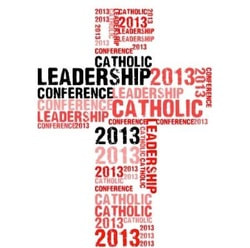
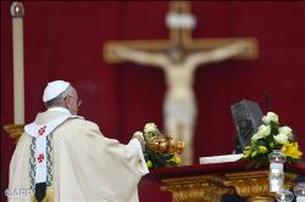

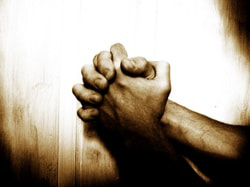
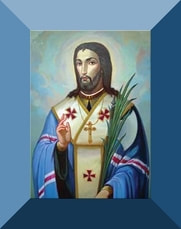
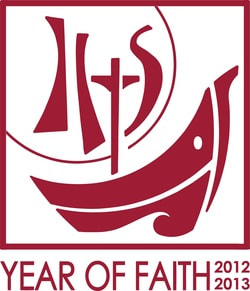

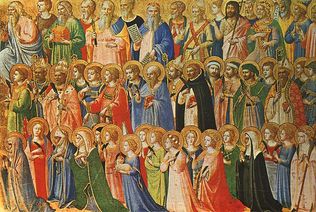
 RSS Feed
RSS Feed